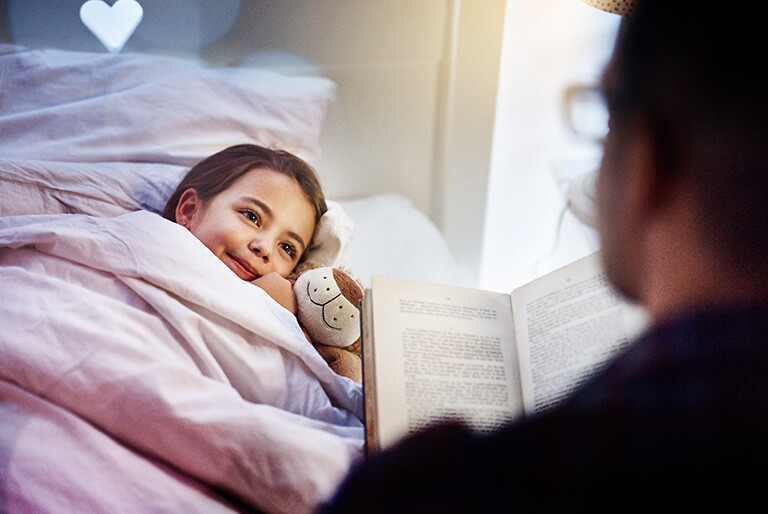
Sleep Guide for Children
Just like adults, it can also be difficult for children to get the proper sleep they need.There are a variety of factors that can contribute to your child’s lack of sleep, and if your little one is struggling to get a good night’s rest, we recommend that you consult with your doctor to identify the issue. It’s important to ensure that your child develops good sleep habits early on.
fill out our contact form below or call us at (812) 342-9666

The Importance of Sleep for Kids
Why is sleep important for children’s development? In addition to giving your child the energy they need during the day, sleep contributes to their overall health in many ways.
Sleep Promotes Growth. For kids, growth hormones are mostly released while your child is in a deep sleep. Sleep is vital for a child to adequately grow.
Sleep Positively Impacts the Heart. When your child has a sleeping disorder, their brain is aroused while they sleep which can trigger fight-or-flight responses multiple times throughout the night. This can raise their blood glucose and cortisol levels.
Sleep Improves the Immune System. Both children and adults produce cytokines (proteins that fight infection and illness) while they sleep. Kids who don’t get at least eight or more hours of sleep a night are more susceptible to illness.
Sleep Helps Learning. A solid night’s rest and a nap or two throughout the day works wonders for a child’s learning, attention span, and overall productivity.
Common Sleeping Problems for Kids
Every child is different and there are a full-scope of problems that could explain your child’s sleepless nights or happen while your child is sleeping. We’ll touch on some of the most common issues that affect sleep.
Insomnia
Insomnia is a sleeping condition that makes it hard to go to sleep or stay asleep. If your child suffers from insomnia, it can often be cured by creating a strong nighttime routine, and ensuring your child has a comfortable, cozy environment to sleep in.
Snoring & Sleep Apnea
Sleep apnea causes people to stop breathing frequently while they sleep. With obstructive sleep apnea (OSA), the soft tissue in the back of the mouth collapses and blocks the airway. OSA can cause loud snoring, daytime drowsiness, headaches, gasping during sleep, and more. If your child has OSA, our Columbus Dental Solutions team can create a custom oral appliance to reposition your child’s jaw and help them get the uninterrupted sleep they need.
Tongue Thrust
Tongue thrust can be a common issue among children while they’re awake and while they sleep. It’s an improper swallowing technique where they place their tongue behind their teeth when they swallow instead of against the top of their mouth. This can lead to difficulty with eating solid foods, and also negatively affect their future tooth alignment. In order to combat this habit, we have myofunctional therapy, and also create custom retainers to keep your child from thrusting their tongue while they sleep.
Restless Leg Syndrome
Restless Leg Syndrome (RLS) is a common problem that children experience where they feel the urge to move their legs at night, or experience discomfort such as itching or pins and needles. This feeling can be caused by certain medications, an iron deficiency, and more. If your child has RLS, speak to a physician to figure out the source of the problem.

Tips For a Good Bedtime Routine
No matter what’s causing your child’s lack of sleep, it’s important that you work with them to create a healthy, consistent bedtime routine.
Consistency is Key
It’s important to stick to putting your child to bed at a certain time in order to keep their internal clock on track. Give your child a heads up when their bedtime is approaching. Stop screen time at least 30 minutes before bed to ensure that the blue light doesn’t negatively affect their sleep-inducing hormones.
Set the Mood
If your child still has a lot of energy before bed, try giving them a few calm activities to do before bed such as taking a warm bath, letting them choose which pajamas they want to wear, singing a song or reading a book, or talking with them about their day. If they require an oral appliance for a sleeping disorder, such as sleep apnea, and don’t want to wear it, try to create a game or storyline around the mouthpiece to show your child it’s nothing to be scared of.
